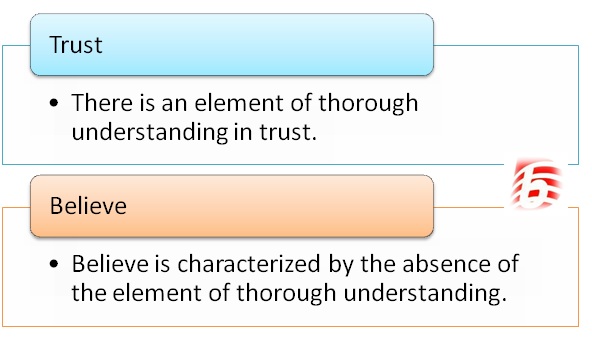Trust vs Believe
Although many English language users consider trust and believe to have similar meanings and use them interchangeably, it’s essential to note that there is a difference between the two words. Trust is used both as a verb and a noun, while believe is only a verb, with its noun form being belief. Trustable and truster are derivatives of the word trust, and examples of phrases using believe include “believe it or not,” “believe me,” and “be unable to believe one’s luck.”
Meaning of Trust
Trust is stronger than believe and is something that stays with you during another person’s difficult times when you have trusted them. It can be described as permanent faith, relying not only on believing or accepting what others say about something but also following their suggestions and instructions. Trust is a step above belief, making believe a subset of trust. Trust is complete faith, whereas belief is a mere thought. Trust is universal, does not change in any circumstance, and is built on friendship and closeness. Trust is also characterized by thorough understanding.
Meaning of Believe
Believe, on the other hand, has a more momentary and temporary sense. It involves accepting what others say about something and is not about completeness. A believer may end up in confusion, troubled with thoughts, ideas, and wild imaginations. Believe may change due to other impulsions both from within and without, and it is built on observation, which can sometimes be deceiving. Believe is not as strong in content as trust and lacks the element of thorough understanding.
Key Takeaways
- Trust is stronger and more permanent than believe, representing complete faith.
- Believe is momentary and involves accepting what others say, while trust goes beyond this by following suggestions and instructions.
- Trust is characterized by thorough understanding, whereas believe lacks this element.
